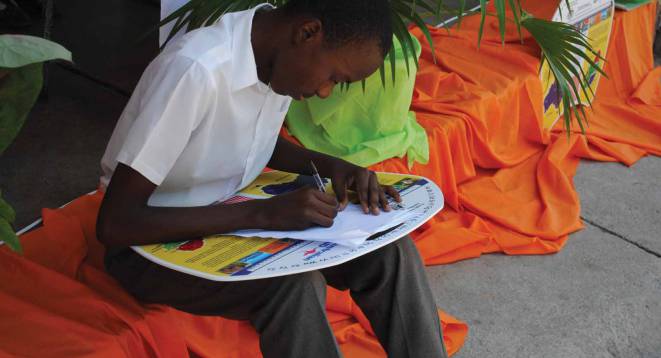From volunteer to CEO: a journey in social enterprise

Just over two years ago Rebecca Sweetman hadn't even heard of social enterprise. Today she's the UK CEO of Tutudesk, a global movement to provide African schoolchildren with portable desks.
Following Archbishop Desmond Tutu's launch of the campaign on 27 September at the UN headquarters in New York, Sweetman reflects on her rapid, but exciting, journey from charity volunteer to social entrepreneur.
This article introduces a series focusing on global education with a special focus on Africa, published in partnership with The Financial Times This is Africa magazine.
In May 2011, I was in Johannesburg volunteering with a friend’s charity for two weeks while thinking about my career options. At the time, I was working as an entry-level management consultant at McKinsey and coming to the end of the two-year programme.
On the final day of my Johannesburg trip, I was introduced to Shane Immelman, founder of a social enterprise that provided lapdesks to African children. He gave me a brochure to read on the way to the airport.
By the time my flight took off, I had learned that African children need portable desks because traditional ones aren’t suitable: there is not enough space and they cannot afford anything else. Shane Immelman’s business model was to offer companies the opportunity to print their logo and educational messaging on desks, which they then gave away to schools.
By the time I landed back in London, I had come up with the idea to sell lapdesks in the UK for people to use while sitting on the sofa or in bed, and use the profits to provide free desks to children in sub-Saharan Africa. I emailed Shane Immelman and, within an hour, he called back to say that he loved my idea – but it wasn’t enough.
Having distributed one million desks so far, he had just agreed with Archbishop Desmond Tutu to rebrand the organisation as the Tutudesk Campaign. To make the best of that, he needed a global reach for the Tutudesk brand and he asked me if I was willing to open the first international office, Tutudesk UK.
This was more than I had expected. But it was no more than I wanted. While in South Africa, an acquaintance who’d been offering me some career advice, told me he was chairing a conference on social enterprise in Cape Town. Social enterprise was a new concept to me, but it sounded interesting enough to make me fly to Cape Town the next day to attend the conference. I left Cape Town realising that if I wanted to use my business skills to have an impact then I wanted to work in social enterprise. I had met Shane for a reason.
Nearly 18 months after I founded Tutudesk UK as part of the global Tutudesk Campaign, it has been an incredibly steep learning curve. At the start I had to consider the logistics of founding a social enterprise. What legal structure did we want? Who would be our first trustees – the people who could open doors, build the credibility of the organisation and provide advice?
Financially, the Tutudesk Campaign was in its infancy and I had accepted the financial responsibility of launching the UK office, so I knew that I needed to close corporate sponsorship contracts fast. To do that, I had to meet the right people, which required some rapid networking. I identified the business groups to join and, because I had no funding, worked hard to be offered free tickets to conferences, accepting invitations to speak where I could.
Everything takes longer than I expected (I think first-time entrepreneurs always say that!), but so far I’ve closed sponsorship contracts for Tutudesks to Zimbabwe, Zambia, Mozambique and Kenya. I’ve hired a representative in Malawi to help close deals with Malawian companies, and I’m discussing a partnership with an organisation that can expand our work in humanitarian emergencies.
Finally, I’ve broadened the activities of Tutudesk UK: we have schools and marathon runners fundraising for Tutudesk. And, of course, I haven’t forgotten my original idea, to retail Tutudesks in the UK – watch this space!
This is just the start. Now I share the responsibility for achieving the Tutudesk Campaign’s goal to provide 20 million Tutudesks to 20 million children by 2020.
Watch a video about The Tutudesk Campaign here.
